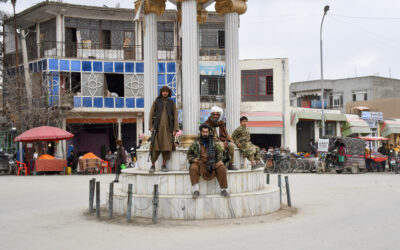
The Long Arm of China’s Security Services
SUBSCRIBER+ EXCLUSIVE REPORTING — When Chinese President Xi Jinping came to San Francisco last November to meet with President Joe Biden, Chinese pro-democracy activists in […] More
Pulitzer Prize Winning Journalist Walter Pincus is a contributing senior national security columnist at The Cipher Brief. He spent forty years at The Washington Post, writing on topics from nuclear weapons to politics. He is the author of Blown to Hell: America’s Deadly Betrayal of the Marshall Islanders (releasing November 2021)
OPINION — President Biden last Thursday showed he had learned the lessons of Vietnam and was applying them today in Afghanistan.
He spelled out the most important lesson when he said, “We did not go to Afghanistan to nation-build.”
Biden then described all that the U.S., its NATO allies and partners had done over 20 years to prepare the Afghan security forces to help the elected Kabul government determine its own fate saying, “We provided our Afghan partners with all the tools — let me emphasize: all the tools, training, and equipment of any modern military.”
Biden’s words took me back to 1966, when Sen. J. William Fulbright (D-Ark.), then Chairman of the Senate Foreign Relations Committee, said of the American effort in Vietnam, “What I do question is the ability of the United States or any other Western nation to go into a small, alien, undeveloped Asian nation and create stability where there is chaos, the will to fight where there is defeatism, democracy where there is no tradition of it, and honest government where corruption is almost a way of life.”
I worked for Fulbright twice in the 1960s and his views from that time have clearly affected my thinking to this day — and perhaps Biden’s.
For example, coming out of the Trump presidential years, as I look at our broken politics at home and our changing role abroad, another Fulbright cautionary statement came to mind: “Having done so much and succeeded so well, America is now at that historical point at which a great nation is in danger of losing its perspective on what exactly is within the realm of its power and what is beyond it. Other great nations, reaching this critical juncture, have aspired to too much, and by overextension of effort have declined and then fallen.”
Looking back, it is clear that during most of the past 20 years, the U.S. did try to nation-build in Afghanistan.
“Since 2001, Washington has spent more on nation-building in Afghanistan than in any country ever, allocating $133 billion for reconstruction, aid programs and the Afghan security forces. Adjusted for inflation, that is more than the United States spent in Western Europe with the Marshall Plan after World War II,” The Washington Post’s Craig Whitlock wrote in a December 2019 article titled, At War With the Truth.
After interviewing diplomats, military officials and aid workers who played direct roles in Afghanistan and Washington, Whitlock wrote, “Instead of bringing stability and peace, they said, the United States inadvertently built a corrupt, dysfunctional Afghan government that remains dependent on U.S. military power for its survival. Assuming it does not collapse, U.S. officials have said it will need billions more dollars in aid annually, for decades.”
But Biden’s comment last week made clear he’s ready to act, “It’s the right and the responsibility of the Afghan people alone to decide their future and how they want to run their country.”
At his Thursday announcement, Biden anticipated what critics would say, starting with the traditional military point of view – that any withdrawal had to be “conditions based,” which meant there was no security threat the Afghan Security Forces could not handle.
“For those who have argued that we should stay just six more months or just one more year, I ask them to consider the lessons of recent history,” Biden said. He explained, “In 2011, the NATO Allies and partners agreed that we would end our combat mission in 2014. In 2014, some argued, ‘One more year.’ So, we kept fighting, and we kept taking casualties. In 2015, the same, and on and on. Nearly 20 years of experience has shown us that the current security situation only confirms that ‘just one more year’ of fighting in Afghanistan is not a solution, but a recipe for being there indefinitely.”
The Cipher Brief hosts private briefings with the world’s most experienced national and global security experts. Become a member today.
Biden’s argument against staying indefinitely – there had once been a U.S. military plan to keep Bagram Air Base to fight regional terrorist groups — was based on the Trump February 2020 agreement with the Taliban to remove all U.S. and NATO allied forces by May 1, 2021. Biden extended that date to September 11, then moved it again to August 31. He pointed out that while the Taliban had not attacked American troops this past year, he warned that they “would have again begun to target our forces…Staying would have meant U.S. troops taking casualties; American men and women back in the middle of a civil war. And we would have run the risk of having to send more troops back into Afghanistan to defend our remaining troops.”
Biden summed up by saying, “After 20 years — a trillion dollars spent training and equipping hundreds of thousands of Afghan National Security and Defense Forces, 2,448 Americans killed, 20,722 more wounded, and untold thousands coming home with unseen trauma to their mental health — I will not send another generation of Americans to war in Afghanistan with no reasonable expectation of achieving a different outcome.”
Last Thursday, a reporter asked Biden, “Mr. President, will the United States be responsible for the loss of Afghan civilian lives that could happen after a military exit?” Biden answered, “No, no, no. It’s up to the people of Afghanistan to decide on what government they want, not us to impose the government on them. No country has ever been able to do that. Keep in mind, as a student of history, as I’m sure you are, never has Afghanistan been a united country, not in all of its history. Not in all of its history.”
It’s worth noting this is not a new view for Biden.
On February 23, 2020, CBS’ Margaret Brennan asked then Candidate Biden, “Don’t you bear some responsibility for the outcome [in Afghanistan] if the Taliban ends up back in control and women end up losing the rights?” Biden responded, “Do I bear responsibility? Zero responsibility. The responsibility I have is to protect America’s national self-interest and not put our women and men in harm’s way to try to solve every single problem in the world by use of force. That’s my responsibility as President. And that’s what I’ll do as president.”
It is what Biden is doing, and that leaves a vacuum that China might fill.
Some regional experts I know have said, “Let them try,” recalling that in recent times the British, Russians and now the U.S. have all attempted and failed either to conquer or create a central Afghan government.
China actually shares a tiny 46-mile border in the far northeast corner of Afghanistan at the end of the Wakhan Corridor, a 185-mile strip of land that also borders Tajikistan on the north, and Pakistan on the south. It once was a thoroughfare of the Silk Road for merchants traveling to and from China. The only way through the mountainous border between Afghanistan and China is Wakhjir Pass, which itself is over 16,000-feet above sea level.
Since 2009, China has helped finance the building of a road along the Afghan Wakhan Corridor along with building up an airport at Taxkorgan, on the Chinese side in Xinjiang, near the Afghan border.
Ironically, Xinjiang is home to the Uyghur Muslims, one million of whom have been put in so-called detention camps over the past few years after being accused by Beijing of separatism and Islamic militancy. U.S. and European human rights groups have accused the Chinese of genocide against the Uyghurs.
In the past, some Uyghur fighters have sought asylum in Afghanistan and Beijing has voiced concerns that Afghanistan was a breeding ground for dangerous terrorists, much as Washington was concerned about al Qaeda being there.
Recently, Taliban spokesman Suhail Shaheen said they see China as a “friend” to Afghanistan and the Taliban would no longer allow China’s Uyghur separatist fighters to enter the country. Shaheen also told the South China Morning Post, “If (the Chinese) have investments [in Afghanistan], of course, we will ensure their safety.”
A hint of what China’s role in Afghanistan will become may emerge this week from the meeting of the Shanghai Cooperation Organization (SCO), which is led by China and Russia and includes most Central Asian countries along with India and Pakistan. Chinese Foreign Ministry spokesperson Wang Wenbin said Friday that Chinese Foreign Minister Wang Yi will attend the meeting. Although not an SCO member, Afghan Foreign Minister Salahuddin Rabbani is also expected to be there. The group will discuss “promoting regional security and stability, advancing the peace and reconciliation process in Afghanistan, and deepening cooperation between the SCO and Afghanistan,” Wenbin said.
As Taliban fighters move to increase their control over Afghan territory, clashes with Afghan government forces will increase and a civil war could begin. By then, it may be Beijing’s problem, not Washington’s.
Read more expert-driven national security insights, perspective and analysis in The Cipher Brief
Related Articles

SUBSCRIBER+ EXCLUSIVE REPORTING — When Chinese President Xi Jinping came to San Francisco last November to meet with President Joe Biden, Chinese pro-democracy activists in […] More

SUBSCRIBER+EXCLUSIVE EXPERT PERSPECTIVE — More than two years after its withdrawal from Afghanistan, the U.S. still does not have a clear way forward in the […] More

SUBSCRIBER+ EXCLUSIVE REPORTING — Ukrainians greeted Saturday’s long-awaited House passage of $60.8 billion in aid with justifiable jubilation. For months, their soldiers, civilians, and political […] More

SUBSCRIBER+ EXCLUSIVE REPORTING — A race for control of space is underway, and just as on earth, the U.S. and China are the top competitors. […] More

SUBSCRIBER+ EXCLUSIVE REPORTING — For nearly a week, the Middle East and much of the world were on a knife’s edge, waiting for a promised […] More

BOTTOM LINE UP FRONT – Less than one week after Iran’s attack against Israel, Israel struck Iran early on Friday, hitting a military air base […] More
Search